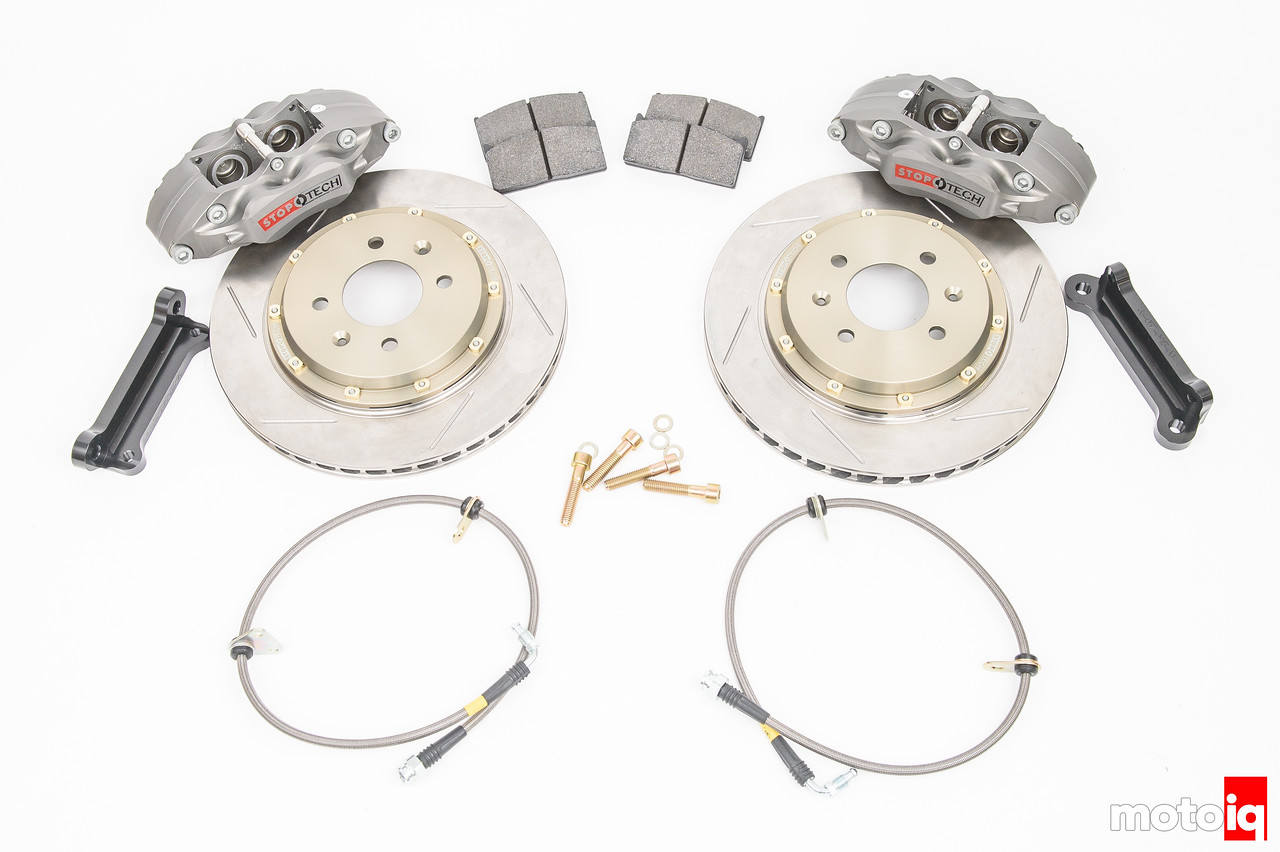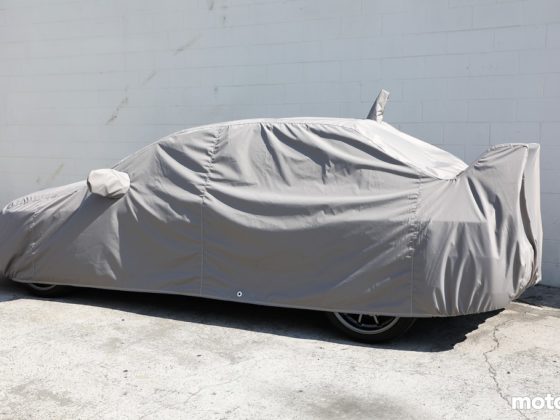The STR42 caliper has stainless steel abutments that prevent the steel brake pad backing plate from digging into the aluminum body and sticking. It also has a bridge bolt on the top of the caliper to help make the caliper body stiffer to help assure a solid pedal.

Braided steel brake lines do not swell as much with pressure and thus deliver better brake pedal feel. They are designed to pass the DOT whip test so they are street legal. The adaptor brackets allow you to bolt the radial mount STR42 caliper onto the ear mount stock knuckle.
Stoptech’s Sport brake pads are designed to be totally streetable but can still take the rigors of autocross and light track use. We will be starting off with these pads and hopefully, we will not have to resort to running an aggressive race pad.







22 comments
Curious if you have any issues with proportioning now. I am running the same kit on my 2000 Civic DX hatchback. I had horrible pedal feel so I installed an Integra type-r 1″ brake master cylinder. Now the pedal feels great but the rear brakes lock up before the fronts which is obviously horrible for lap times. Could it be my stock drums in the rear causing this issue? Wondering if I need to convert the rears to disks or get an adjustable proportioning valve.
On your car, drum brakes are self-energizing (the shoes wedge in place on initial application) so the proportioning valve in the ITR M/C sends a lot more pressure to the rear brakes than what drums need. Converting to rear discs should clear it up.
Thank you for the reply I really appreciate it. Love the site and tech articles you’re my first car site I check daily 😀
Great write-up! The breaks on my old GSR were great for street use but, even on long trips, would get soft when they heated up. I know, back in the day, that quite a few Civic owners would seek out stock GSR calipers to swap in.
ugh… my number one complaint about wilwoods is that they don’t use banjo bolts for the brake lines… and here is stoptech copying them… why are the stupid ideas the ones that get copied? google copied apple with the whole ditching the headphone jack, and now stoptech is copying wilwood ditching banjo bolts
I kinda don’t like banjo fittings myself. Break easy and more places to leak.
but but… oem’s use banjo fittings… and at least you can orient them so they’re pointed the way they need to me… these stupid angled fittings are either too tight, too loose, or pointed the wrong way…
and really? You’ve seen banjo’s break? I mean granted you’re around a lot more race cars than I am, but the main reason I hate these angled fittings is cause I feel like they’re gonna snap on me at any moment…
Yes, don’t ask me how I know!
Well… uh… how do you know? I mean that kinda the reason I come to motoiq…
I broke them, apparently by over tightening trying to get the copper crush washers to seat and quit leaking brake fluid. I have done this twice and was surprised about how little force it took.
What are the kit and rotos p/n and where can we get it?
The part number for this specific kit is 87.057.8P00.R1.
You can follow the links to StopTech’s web site to look for more info or an authorized retailer.
Unless you are running a good hybrid pad i think you need to go pretty massive on your breaks before a stock pad can keep up to any kind of tracking greater than 3 laps.
Pads are huge! They can make stock braking systems work on track as long as your fluid is up to snuff. I have seen a few occasions where people have blamed brake issues on boiling fluid when in reality it was the street pads turning into so much hot dust and gas. The lower offgassing temperature pad components tends to give up the ghost and then you get a soft compressible layer of remaining pad material. Fixed with a proper pad.
I totally agree with you that race pads can make stock brakes trackable but pads that will make stock brake systems fade resistant under track conditions are not even close to being streetable. They won’t form a transfer film at low street temperatures and will quickly eat up the rotors, sometimes in just a few hundred miles. They will also be super noisy and dusty on the street.
in addition to what Mike said, pads and rotors will also last considerably longer with a BBK cause of how much better the cooling is, although these rotors are only 22mm thick so cooling might not be a huge advantage… and you’ll have better pedal feel when things get hot cause a fixed opposed piston caliper doesn’t flex anywhere near as much as sliding caliper does
Another great point!
This kit is 2x the price of willwoods, how are they that much better?
Getting perfect proportioning is a big part of it.
with minor modification, i fit some 2-piston sliding calipers from 199x? G20t onto a Honda Intega DC2, or Civc EG5 brake bracket.
Just wondering how is the wheel clearance with the stoptech bbk and various 15in wheel offsets? Would the stock 15×6 wheels clear?
The kit looks similar to the fast brakes kit for SCCA STL hondas.
There is pretty decent clearance.
Okay, how are you supposed to bleed these calipers? I t appears there are set-screws where the bleed-nipples should be.